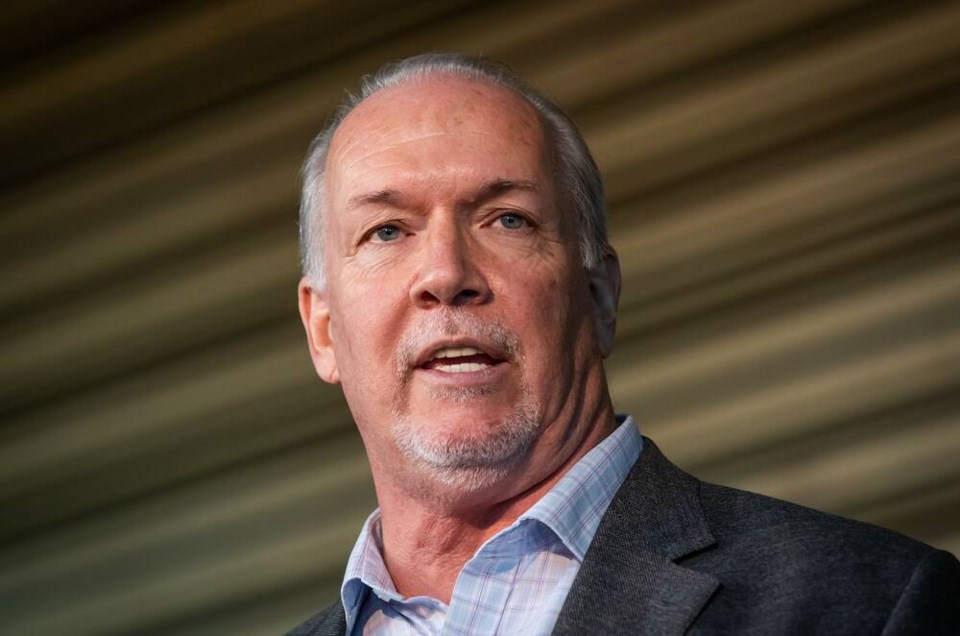What the NDP government is doing to the information and privacy law is considered offensive in a number of quarters. How they are doing it is just as bad.
Citizens’ Services Minister Lisa Beare tried to defend the changes initially by reciting banal talking points. A few backbenchers offered some weak explanations of how great it was. Premier John Horgan pitched in last week and talked himself into a bizarre rant about all the annoying “fishing trips” the Opposition makes via the freedom-of-information program.
He waved his phone in front of cameras and invited B.C. Liberals to drop by and look at his computer anytime they want.
“Like, get real. Who cares what’s on my screen? Not many people.”
It was loopy comic relief, but not much of an explanation for imposing FOI application fees, or dropping data protection measures, or ignoring the required committee review.
This week, the tone changed. Insipid and clumsy didn’t seem to be working, so the NDP switched to supercilious and condescending. That attitude emerged when the Opposition moved to defer the bill for a while, a standard parliamentary move to stall a controversial bill. It usually forces several more hours of debate, as government and Opposition argue the merits of delaying passage.
This time, the NDP went mute. The entire government side opted out of debating the amendment. There was a Social Credit cabinet minister decades ago who registered his contempt for the Opposition by turning his chair and facing the wall when a critic asked him questions. Even by the standards of the old days, it was rude beyond belief.
This week’s move was the equivalent of that. The precise motion was to refer the changes to a legislature committee. But that’s the same committee that the government pre-empted by introducing the bill in the first place. Obviously it would have been too much of a retreat to do so. But the NDP can’t even be bothered to explain that.
So they sat staring into their screens for two days as the Opposition talked, then voted down the motion on Tuesday, without a word of explanation.
“Not one of them could muster one word, not one syllable to justify the vote … and that is despicable,” said Liberal MLA Mike de Jong. He reached 30 years as an MLA last week and said he has never seen such a thing.
He summed up the NDP government 2.0 approach as: “We will do what we want, when we want, because we can.”
(Parliamentary geeks might appreciate one wrinkle. The NDP chair of the committee that is required by law to review the FOI law voted against doing exactly that. De Jong described that as: “Please don’t send us the work we’re statutorily obliged to do.”)
Beare had another opportunity to defend the bill Tuesday. Instead, she complained briefly about the Opposition creating misinformation to frighten people and moved it along to the next stage of debate.
Meanwhile, the B.C. Liberals opened a new front in what’s turning into a war over the bill. The new angle has a weird conspiracy theory feel to it. But it’s based simply on the bill as written.
A section on data-linking, the practice of merging or connecting different data banks together, allows the government, with some qualifications, to share data that was posted on social media by the individual the information is about.
Data-linking can be a benign way to analyze trends or profiles of public views. But the Opposition said the government giving itself the right to use people’s online posts is brand new.
“This has the potential of being a significant invasion of personal privacy,” B.C. Liberal MLA Todd Stone said.
Another B.C. Liberal MLA, Rene Merrifield, highlighted government officials building profiles of citizens using social media. She referred to the Cambridge Analytica scandal and said it “should send chills up your spine.”
Any further details on that move are to come in the form of regulations. The information and privacy commissioner has already noted the excessive reference to future regulations all the way through the bill.
Next up is line-by-line arguments over the bill. At least, that’s what’s scheduled. It depends on whether the NDP, now secure in its majority, feels the need to explain itself.
lleyne@timescolonist.com


